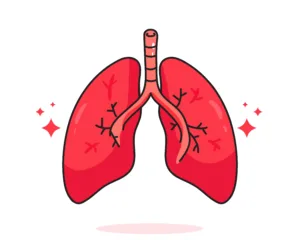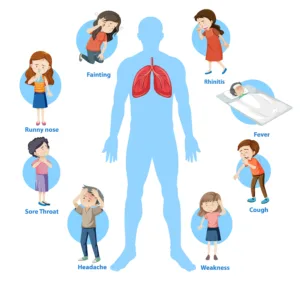What is Bronchitis?
In simple language to understand it, is Bronchitis is referred to the tubes that carry air to your lungs, called the bronchial tubes, get inflamed and swollen and leaves you with a nagging cough and mucus.
There are two types of Bronchitis:
Acute bronchitis- This is more common. Symptoms last a few weeks, but it doesn’t usually cause problems past that time.
Chronic bronchitis- This one is more serious. It keeps coming back or doesn’t go away.

Bronchitis Symptoms
Symptoms of both acute and chronic bronchitis include breathing problems, such as:
Chest congestion, when your chest feels full or clogged, A cough that may bring up mucus that’s clear, white, yellow, or green, Shortness of breath, Wheezing or a whistling sound when you breathe, faint, fever, headache.

Symptoms of acute bronchitis also may include:
Body aches and chills, Feeling wiped out, Low fever, Runny n stuffy nose, Sore throat.
Now even after the other symptoms of acute bronchitis are gone, the cough can last a few weeks while your bronchial tubes heal and the swelling goes down. If it goes on much longer than that, the problem might be something else.
Now let’s see some Bronchitis Causes
Most of the time, it will be the same viruses that give you a cold or the flu that cause acute bronchitis. But sometimes, bacteria bring it on.
In both cases, as your body fights the germs, your bronchial tubes swell and make more mucus. That means you have smaller openings for air to flow through, which can make it harder to breathe.
Chronic bronchitis causes include:
Air pollution like chemical fumes and dust in air which makes breathing difficult, Smoking or passive smoking for a longer time.
Bronchitis Risk Factors
If you are doing either of the listed stuff then have a higher chance of getting either kind of bronchitis if:
Regular Smoking, in case of existing asthma and allergies, if you have a weaker immune system. This is sometimes the case for older adults and people with ongoing diseases, as well as for babies and young children. Even a cold can make it more likely, since your body’s already busy fighting those germs.
Diagnosis
If you have either of the symptoms listed below then you must visit the doctor.
Cough causes chest pain
Keeps you awake at night
Brings up blood or mucus that thickens or darkens
Lasts more than 3 weeks
Has a whistling sound and makes it hard to speak
Comes along with unexplained weight loss
Also, it is important to mention that Bronchitis can lead to pneumonia, though it is very rare. Usually, it doesn’t cause any other problems.
Now you doctor will diagnose it with based on some physical test and your symptoms like he might ask you about your cough frequency, such as how long you’ve had it and what kind of mucus comes up with it. They’ll also listen to your lungs to see whether anything sounds wrong, like wheezing. Test to be done.
Oxygen level test in the blood, Lung function test, Chest X-ray, some blood tests and a test of your mucus also to determine diseases caused by bacteria.
Bronchitis Treatments and Prevention
Since, there are 2 types of bronchitis. So, most of the time, acute bronchitis goes away on its own within a couple of weeks.
If bronchitis is caused by bacteria (which is rare), your doctor may give you an antibiotics. If you have asthma or allergies, or you’re wheezing, they might suggest an inhaler. This helps open your airways and makes it easier to breathe.
To ease your acute bronchitis symptoms, you can:
Drink a lot of water. Eight to 12 glasses a day helps thin out your mucus and makes it easier to cough it up.
Get plenty of rest, take over-the-counter pain reliever if needed. Aspirin, ibuprofen, or naproxen treat pain. But avoid giving aspirin to children. You can use acetaminophen to treat both pain and fever.
Take hot shower as it loosens the mucus.
Cough medicines are helpful as they help you to loosen your mucus so it’s easier to cough up.
Whereas, chronic bronchitis treatments based on your symptoms and include:
Medications like antibiotics, anti-inflammatories, and bronchodilators to open your airways.
Oxygen therapy so you can breathe better.
A mucus-clearing device to help you cough it up fluid more easily.
Pulmonary rehab, an exercise program that can help you breathe more easily and exercise more.
Bronchitis Prevention
To lower your chances of getting acute bronchitis or a flare-up of chronic bronchitis:
Stay away from cigarette smoke.
Get the flu vaccine since you can get bronchitis from the flu virus.
Make sure your vaccines are up to date.
Wash your hands often.
Wear a mask when you’re around things that bother your lungs, such as pollution, paint, fumes.